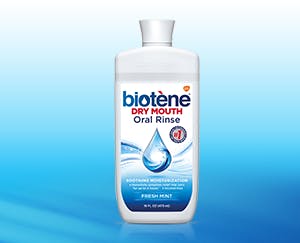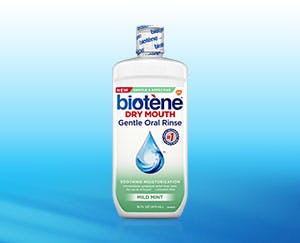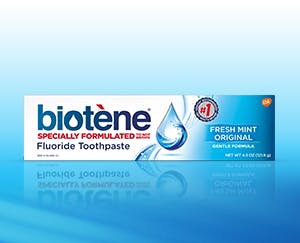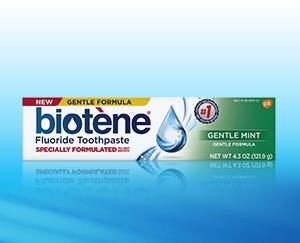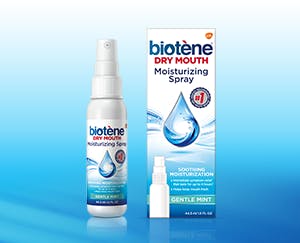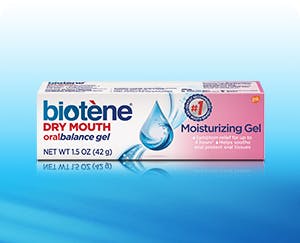As a family caregiver, you’re always looking out for your loved one’s health. This includes monitoring their condition for new symptoms and checking for any side-effects of their prescriptions. One common problem among the elderly, especially those with existing health issues, is Dry Mouth. Dry Mouth, or Xerostomia, is a common condition affecting up to 1 in 5 adults in the USA. Use this quick test to help assess your loved one’s risk factors and symptoms.
QUIZ content below:
Want to find out if your loved one may be suffering from Dry Mouth, or is at risk? Use this 10-question quiz as an assessment tool to help you help them.
Thank you for taking our Dry Mouth quiz for caregivers. Your family member may be at risk for Dry Mouth.
- Speak with their doctor, dentist or pharmacist about Dry Mouth and possible remedies.
- Explore Biotène Oral Rinse, Oralbalance Gel, and Moisturizing Spray for dry mouth symptom relief.
Taking multiple medications can increase the chance of experiencing a dry mouth by up to 40%. Common drugs, like over-the-counter cold and allergy medicines, anti-depressants, prescriptions for acid reflux and some beta blockers, are known to either cause or worsen Dry Mouth.
Chemotherapy can thicken saliva whilst radiation therapy to the head or neck can suppress saliva production.
Diabetes sometimes causes a dry mouth, because the condition reduces the amount of saliva the body produces. Around 40% of patients with diabetes suffer from Dry Mouth.
Inhalers commonly used for asthma and COPD have been linked to Dry Mouth. Beta-2 agonists can affect salivary glands, reducing saliva production and corticosteroid inhalers can have a topical effect on your family member’s oral tissues. This can change their sense of taste and make swallowing and speaking more difficult.
Drinking alcohol and smoking or chewing tobacco can increase dry mouth symptoms.
By the time your family member complains of thirst, their saliva flow is probably already too low. Chewing gum, drinking water or sucking on hard candies may provide temporary relief. Biotène Oral Rinse, Oralbalance Gel, and Moisturizing Spray may provide long lasting dry mouth symptom relief. These contain a combination of moisturizers and lubricants to help relieve oral dryness.
Other signs you may spot are redness or cracks at the corners of their mouth, repeated lip smacking or lipstick sticking to their teeth. Untreated Dry Mouth can also negatively impact your family member’s oral health, as the reduction in saliva hinders the body’s ability to fight plaque.
Dry Mouth is often worse at night and can cause disturbed sleep and repeated waking. 70% of subjects reported that using the Biotène Oral Rinse helped to reduce the number of times they woke up from dry mouth.*
Your family member needs saliva to fight the bacteria that cause bad breath. Biotène OralBalance Gel reduces the impact of dry mouth on social interactions (by 34.5%**)
Dry Mouth can make eating more difficult and can also affect your loved one’s speech. Biotène Moisturizing Spray contains a mouth moisturizing formula that refreshes and moistens instantly to help maintain a healthy oral environment and provide relief of dry mouth symptoms.
Your family member needs saliva to fight the bacteria that cause bad breath. Biotène® OralBalance Gel reduces the impact of dry mouth on social interactions (by 34.5%**)
Dry Mouth can make eating more difficult and can also affect your loved one’s speech. Biotène® Moisturizing Spray contains a mouth moisturizing formula that refreshes and moistens instantly to help maintain a healthy oral environment and provide relief of dry mouth symptoms.
No problem! Your relative doesn’t appear to show signs of Dry Mouth.
- Biotène Fresh Mint Toothpaste is designed not to irritate and helps protect against cavities.
- If you notice Dry Mouth symptoms in future, discuss it with your loved one’s health professionals.
* After 28 days of use in a clinical study
** Improvement versus (vs.) water as measured in a 28-day clinical study


